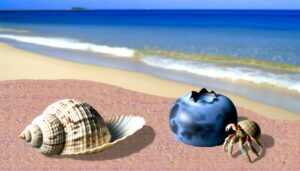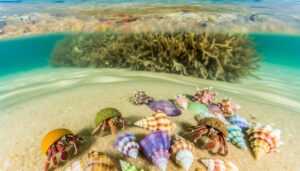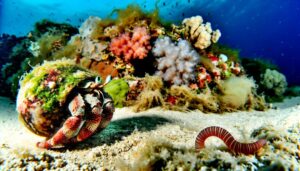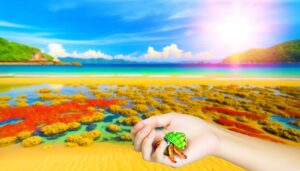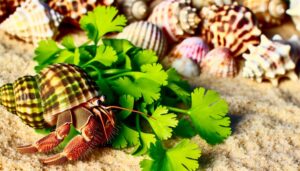How Hermit Crabs Eat Kale Safely
You shouldn't feed hermit crabs hot dogs. Hot dogs contain harmful preservatives, high fat, and excessive sodium levels.
These ingredients can disrupt your crabs' digestive systems and cause serious health issues like obesity, liver problems, and poisoning. Hermit crabs require a varied diet rich in proteins, healthy fats, vitamins, and minerals.
Safe treats include fruits, vegetables, nuts, seeds, and insect-based proteins like crickets and mealworms. Providing a balanced diet ensures your hermit crabs thrive and maintain their health.
To optimize their diet and learn about alternative protein sources, expanding your understanding will be advantageous.
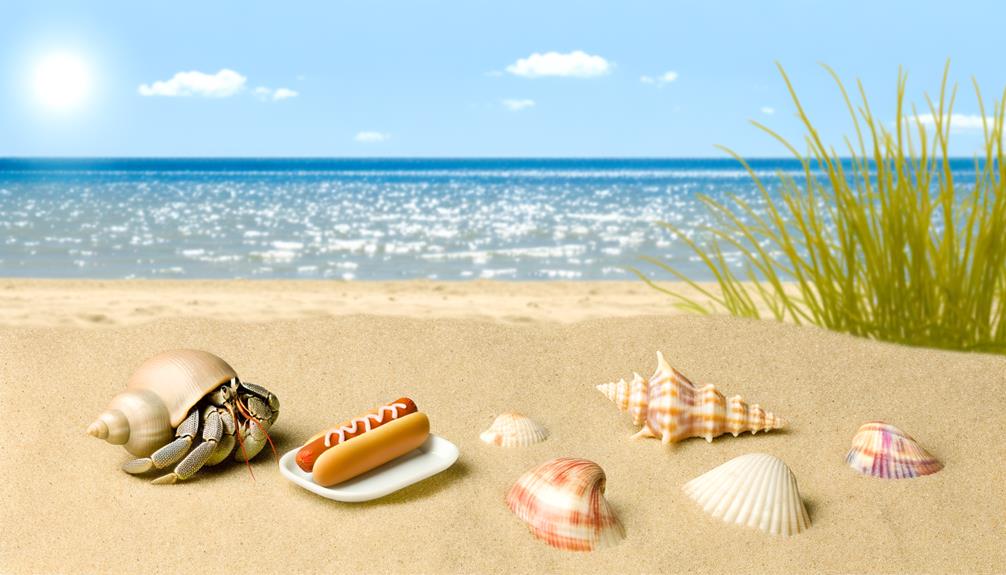
Key Takeaways
- Hot dogs contain preservatives and artificial colors harmful to hermit crabs.
- High fat content in hot dogs can lead to obesity and liver problems.
- Excessive salt in hot dogs can cause dehydration in hermit crabs.
- Processed foods like hot dogs can cause digestive blockages and metabolic imbalances.
- Safe alternatives include fruits, vegetables, nuts, seeds, and insect-based proteins.
Hermit Crab Diet Basics
When you're considering what to feed your hermit crab, understanding that their diet should closely resemble what they'd find in their natural surroundings is crucial.
Hermit crabs are scavengers, meaning they consume a variety of plant and animal matter, such as decaying wood, fallen leaves, fruits, and small invertebrates. They thrive on a varied diet that provides essential nutrients and maintains their environment clean.
Aim to offer foods rich in calcium and carotenoids, such as cuttlebone and carrots, to support shell health and vibrant coloration. Avoid processed or high-sodium foods, as they can harm your crab.
Nutritional Needs
To guarantee your hermit crab thrives, it's important to provide a balanced diet that meets their specific nutritional needs. Hermit crabs require a mix of proteins, carbohydrates, fats, and essential vitamins and minerals.
Proteins support growth and exoskeleton health, while carbohydrates offer energy. Fats are necessary for cellular functions and hormone production. Key vitamins include A, D, and E, which aid in vision, calcium absorption, and antioxidation. Minerals like calcium and iodine are essential for molting and overall health.
Freshwater and marine saltwater sources should be available to mimic their natural habitat. By understanding these dietary components, you can ensure your hermit crab receives ideal nutrition, promoting longevity and well-being in their care.
Common Foods
A variety of common foods can meet the nutritional demands of hermit crabs, supporting they receive a balanced and complete diet.
Fresh fruits like apples, bananas, and mangoes are excellent sources of vitamins and minerals.
Leafy greens such as spinach and kale provide essential nutrients.
Protein is vital; you can offer small amounts of cooked chicken, fish, or eggs.
Nuts and seeds, in moderation, supply healthy fats.
Calcium is crucial for shell health, and you can provide this through crushed eggshells or cuttlebone.
Avoid foods high in salt or sugar.
By offering a diverse diet, you'll support your hermit crabs thrive, supporting their growth, molting, and overall well-being.
Always wash fresh foods thoroughly before serving.
Processed Foods Impact
Processed foods often pose significant risks to hermit crabs due to their high levels of preservatives, additives, and unhealthy fats. You should understand that hermit crabs have a delicate digestive system tailored for natural, unprocessed foods. Introducing processed items can lead to myriad health issues, including digestive blockages and metabolic imbalances.
Preservatives and additives can be toxic, potentially causing long-term damage to their organs. Unhealthy fats and high sodium content in processed foods can disrupt their electrolyte balance and lead to dehydration. By avoiding processed foods, you'll guarantee that your hermit crabs maintain peak health and well-being.
Hot Dogs Ingredients
Examining the ingredients in hot dogs reveals a complex mix of meats, fillers, preservatives, and artificial additives that can be damaging to hermit crabs' health.
You'll find that hot dogs often contain mechanically separated meats, like pork, beef, and chicken, which are processed to an extreme degree.
Fillers such as corn syrup and modified food starch add bulk but lack nutritional value.
Preservatives like sodium nitrite and artificial additives, including flavor enhancers and colorings, are commonplace.
These ingredients are designed to extend shelf life and enhance taste for human consumption, but they don't align with the natural dietary needs of hermit crabs.
Understanding these components is essential to ensuring the well-being of your hermit crabs.
Health Risks
Considering the myriad of harmful ingredients in hot dogs, feeding them to your hermit crabs poses significant health risks that can lead to serious, even fatal, consequences.
Hermit crabs require a diet rich in natural minerals and devoid of processed substances. Hot dogs contain preservatives, artificial colors, and flavors that can disrupt your crabs' delicate digestive systems. The high fat content can lead to obesity and liver problems, impairing their overall health. Additionally, nitrates and nitrites, commonly found in hot dogs, are toxic to hermit crabs and can cause severe poisoning.
Sodium Concerns
You should consider the high sodium content in hot dogs, as it poses significant risks to hermit crabs. Excessive salt can lead to dehydration and disrupt their osmoregulatory processes, which are essential for maintaining fluid balance.
Consequently, this imbalance can cause severe health issues and compromise their overall well-being.
Excessive Salt Risks
Due to their small size and unique physiology, hermit crabs are highly susceptible to sodium imbalances, making the excessive salt content in hot dogs particularly risky for them. Sodium plays an important role in cellular function and osmoregulation. However, an overabundance can lead to severe health issues.
| Substance | Safe Level for Hermit Crabs | Sodium Content in Hot Dogs |
|---|---|---|
| Sodium (Na) | <0.1% of diet | Approximately 2% |
| Chloride (Cl) | <0.1% of diet | Approximately 1.5% |
| Potassium (K) | Balanced with Na/Cl | Minimal |
Exposing hermit crabs to high sodium levels from hot dogs can disrupt their osmotic balance, leading to dehydration and potential cellular damage. Therefore, it's essential to avoid such high-sodium foods in their diet to maintain their well-being.
Health Implications
Understanding the excessive salt risks highlights the broader health implications of sodium concerns for hermit crabs, as elevated sodium levels can compromise their physiological functions and overall well-being. Sodium imbalances can lead to several critical issues:
- Dehydration: Excessive sodium disrupts water balance, causing severe dehydration.
- Osmoregulation Failure: Hermit crabs rely on precise sodium levels for osmoregulation, and an imbalance can lead to cellular damage.
- Metabolic Stress: Increased sodium levels can strain metabolic processes, reducing energy efficiency.
- Organ Damage: Long-term exposure to high sodium can harm essential organs, including the kidneys and exoskeleton.
Preservatives and Additives
You should consider the health risks associated with the preservatives and additives commonly found in hot dogs when feeding them to your hermit crabs. These substances can disrupt their natural diet and lead to potential health issues.
Hermit crabs thrive on a diet that mimics their natural environment, where such chemicals are absent.
Health Risks Involved
When you consider feeding hermit crabs hot dogs, it's important to analyze the health risks associated with the preservatives and additives commonly found in processed meats. These substances can be harmful to hermit crabs.
Let's break down the potential dangers:
- Nitrates and Nitrites: These are used to preserve color and prevent spoilage but can be toxic to hermit crabs.
- Sodium: High sodium levels can lead to dehydration and disrupt their osmoregulatory balance.
- Artificial Flavors and Colors: These chemicals can cause allergic reactions and stress in hermit crabs.
- BHA and BHT: These preservatives have been linked to cancer and other health issues in various animals.
Natural Diet Preference
Given these significant health risks associated with preservatives and additives in processed meats, hermit crabs naturally thrive on a diet that mimics their wild, unprocessed food sources. You'll find that they flourish on a variety of fresh fruits, vegetables, and proteins like fish or shrimp. Their digestive systems are adapted to break down natural, nutrient-rich foods rather than synthetic substances.
When you offer them commercial foods, check for harmful preservatives like ethoxyquin or BHT. Instead, opt for organic, preservative-free options that align with their natural dietary needs. By doing so, you're not just meeting their nutritional requirements but also promoting their overall well-being, ensuring they lead healthier, longer lives. Your dedication to their care truly makes a difference.
Safe Treats
Safe treats for hermit crabs should be carefully selected to guarantee they provide nutritional value without introducing harmful substances. You'll need to focus on natural, unprocessed options that mimic their natural diet.
Here are four safe treat options:
- Fruits: Small pieces of mango, apple, and banana are rich in vitamins and minerals.
- Vegetables: Leafy greens like spinach and kale offer essential nutrients and hydration.
- Nuts: Crushed almonds and walnuts provide healthy fats and proteins.
- Seeds: Sunflower and flax seeds are excellent for adding variety and nutrients.
When offering these treats, make sure they're free from pesticides and thoroughly washed. By doing so, you'll promote the health and well-being of your hermit crabs.
Alternative Protein Sources
When considering alternative protein sources for hermit crabs, you'll find insect-based options and various types of seafood particularly beneficial.
Insects like mealworms and crickets provide essential nutrients and closely mimic what hermit crabs might encounter in their natural habitat.
Additionally, seafood such as shrimp and fish can offer high-quality protein, enhancing their overall health and growth.
Insect-Based Protein Options
Incorporating insect-based protein options into a hermit crab's diet offers a sustainable and nutrient-rich alternative to traditional food sources. When you consider adding these proteins, you're providing essential nutrients like amino acids, vitamins, and minerals.
Here are four excellent insect-based protein choices:
- Crickets: High in protein and easy to digest.
- Mealworms: Rich in fat and protein, promoting healthy growth.
- Black soldier fly larvae: Packed with calcium and beneficial fats.
- Silkworms: Abundant in amino acids and low in fat.
These options not only meet the nutritional needs of hermit crabs but also promote environmental sustainability. Your commitment to exploring these alternatives can greatly enhance the well-being of your hermit crabs and contribute to ecological balance.
Seafood and Fish Choices
While insect-based proteins offer a solid nutritional foundation, exploring seafood and fish choices can further diversify a hermit crab's diet, providing essential omega-3 fatty acids and other vital nutrients. You can introduce small portions of shrimp, fish, and krill into their feeding regimen.
Make sure that the seafood is free from preservatives, salt, and any artificial additives. Fresh or freeze-dried options are preferable as they retain more nutrients. Additionally, consider rotating these protein sources to prevent dietary monotony and guarantee a thorough nutrient profile.
Feeding Tips
To secure your hermit crabs receive a balanced diet, you should analyze the nutritional content of their food and include a variety of proteins, fruits, and vegetables. Focus on providing nutrient-rich items that support their growth and health.
Consider the following tips:
- Protein Sources: Offer shrimp, fish, eggs, and lean meats. Avoid processed foods like hot dogs.
- Fruits: Include apples, bananas, and mangoes. Confirm they're free from pesticides.
- Vegetables: Provide leafy greens, carrots, and broccoli. Rinse them thoroughly to remove any chemicals.
- Calcium: Crushed eggshells or cuttlebone are excellent for shell health.
Monitor your crabs' eating habits and adjust their diet as needed. By following these guidelines, you'll secure they thrive and remain healthy.
Conclusion
Coincidentally, while you might enjoy a hot dog at a summer barbecue, feeding one to your hermit crab isn't recommended. The high salt, preservatives, and additives in hot dogs don't meet your crab's nutritional needs and could harm them.
Instead, focus on providing natural protein sources like fish or lean chicken. By understanding your hermit crab's diet and avoiding processed foods, you'll guarantee it thrives in its little habitat.
Remember, their health is in your hands.


